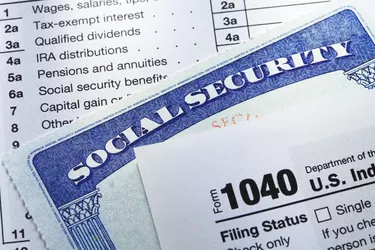
The Internal Revenue Service collects Social Security taxes under the authority of the Federal Insurance Contribution Act. Most employers must comply with the act by deducting Social Security tax from your paycheck and paying the employer portion as well. If your employer does not withhold Social Security tax, he may consider your employment as a relationship other than employer-employee.
Employee
Video of the Day
According to the Internal Revenue Service, you qualify as an employee under common-law rules if your employer controls what you do and how it will be done. Even if your employer allows you freedom in performing your job, you are still an employee if your employer dictates the details of how you perform the work assigned to you.
Video of the Day
Employer Responsibilities
As an employee, your employer must deduct Social Security and other state, local and federal taxes mandated under statute. If you are classified as an employee and your employer does not withhold Social Security tax, file a case with the IRS. Fill out IRS Form 3949-A online to report noncompliance (see Resources). You should then print the completed form and mail it to: Internal Revenue Service, Fresno, CA 93888.
Independent Contractor
If the person for whom you work classifies you as an independent contractor consistent with the Internal Revenue Code, he does not have to deduct Social Security taxes from your pay. Generally, you are an independent contractor if the person contracting you has the right to govern the result of the work but has no control over the method you employ to accomplish the job requirements.
Your contributions to Social Security taxes include both the employee and employer portions. As of 2011, you are responsible for self-employment taxes that include Social Security tax of 10.4 percent and Medicare tax of 2.9 percent. Other federal, state and local taxes may also apply to your profit figure.
Statutory Nonemployee
Generally, only two categories -- direct sellers and licensed real estate agents -- qualify as statutory nonemployees. If this classification applies to you, your income should come from sales, not from the number of hours you work, and you should have signed a contract that says your employer will not treat you as an employee for the purposes of paying federal taxes.
As a statutory nonemployee, you must pay all taxes obligated under federal, state and local tax laws.
Considerations
If you pay self-employment tax because of your employment classification, you can deduct the employer portion of the tax -- 6.2 percent for Social Security and 1.45 percent for Medicare in 2011 -- from your net profit from business. Use Schedules C and SE to figure your profit from self-employment and the resulting self-employment tax.
- IRS.gov: Instructions for Schedule C -- Profit or Loss From Business
- IRS.gov: Instructions for Schedule SE (Form 1040) -- Self-Employment Tax
- SSA.gov: What Is FICA?
- IRS.gov: Independent Contractor, Self-Employed or Employee?
- IRS.gov: How Do You Report Suspected Tax Fraud Activity?
- IRS.gov: Statutory Employees
- IRS.gov: Social Security Tax / Medicare Tax and Self-Employment
- IRS.gov: Form 3949-A